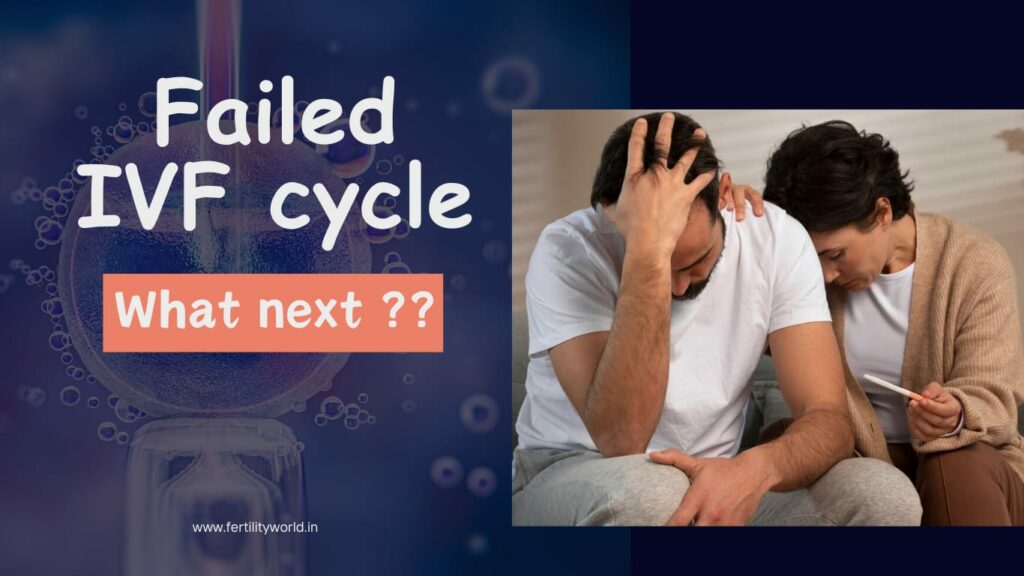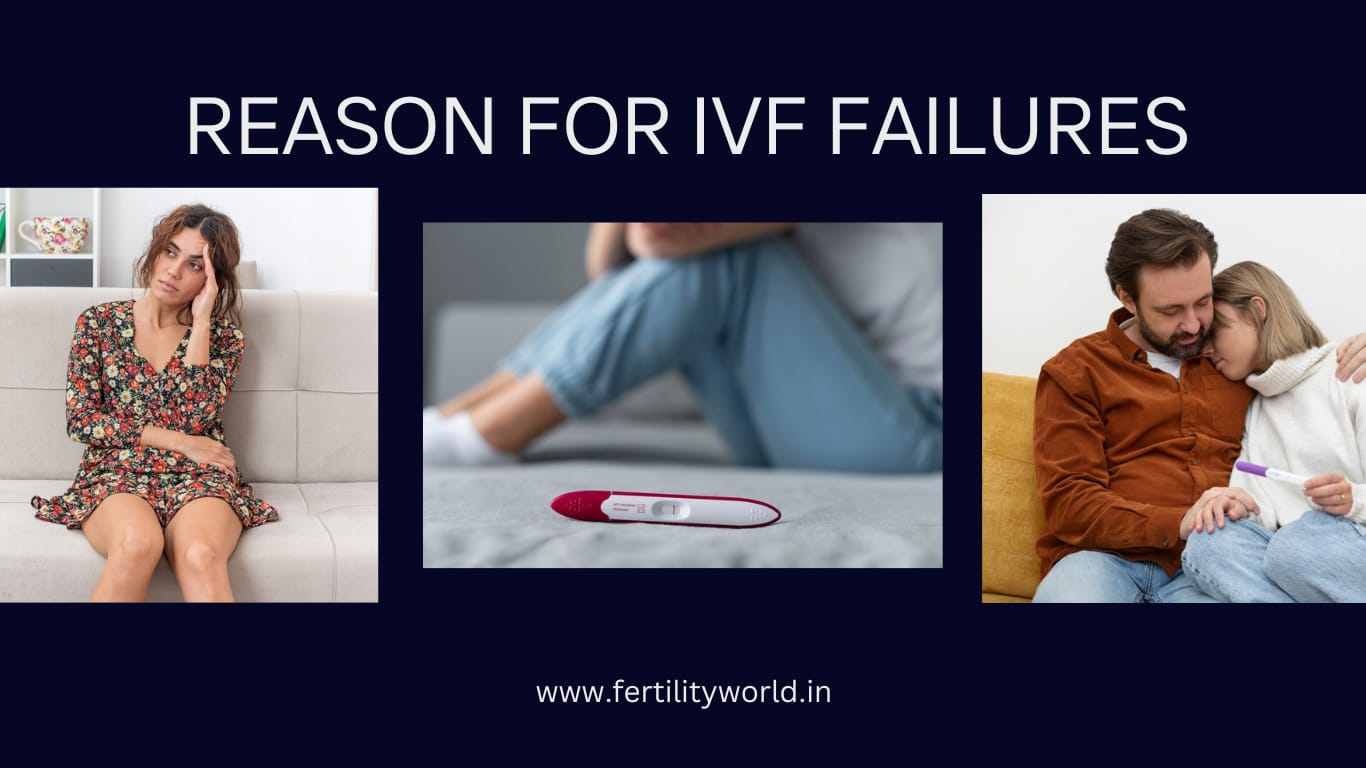IVF is the highest demanding infertility treatment for almost all infertile patients around the world. The fertilityworld has been the most successful IVF treatment provider in pan India for 25+ years, delivering parenthood to more than 40,000+ infertile parents with healthy babies. From these long years of experience in IVF, the fertilityworld team has listed “What are the reasons for IVF failure | Infertility treatment?”, the most common reasons that can lead to IVF failure.
- Book an online appointment: Get a free IVF consultation.
- Call/W: +91 9311850412Email:info@fertilityworld.in

Available fertility treatments
The fertilityworld has in place detailed fertility treatments under its roof in pan India. It provides free consultations before deciding to undergo any of the following treatments and services available:
- In-vitro fertilization (IVF),
- Intracytoplasmic sperm injection (ICSI),
- Intrauterine Insemination (IUI),
- Frozen embryo transfer (FET),
- Laser-assisted hatching (LAH),
- Semen analysis testing,
- Surgical sperm aspiration,
- Hysteroscopy & Laparoscopy,
- Services: Donor Assistance (egg, sperm, & embryo),
- Fertilization Assistance,
- Child delivery assistance, etc
What is IVF treatment?
In-vitro fertilization (IVF) is the highest dependent ART infertility treatment for all infertile parents to achieve a second chance of parenthood with a healthy baby. IVF involves a simple series of fertility procedures including pre-fertility screening, medication, influence periods, ovarian reserve stimulation, mature eggs retrieved from ovaries and fertilized by the partner sperm in the laboratory, embryo transfer to the uterus by IVF implantation, and pregnancy confirmation test after a few weeks. One complete IVF cycle takes about 2 to 3 weeks. In some major fertility conditions, the steps are split into different parts and the process can take longer.
Advantages of IVF treatments?
- IVF prevents the passing of genetic disorders to a child.
- IVF can avoid or decrease your chances of miscarriage.
- Patients can select a perfect time to undergo IVF.
- IVF allows patients to use donated eggs and/or sperm.
- IVF succeeds where other infertility treatments fail.
- IVF overcomes infertility factors in both men and women.
- IVF can be approached by anyone in any age group.
- The high success rate of pregnancy is 85% using donor eggs, and 75% using self-eggs.
IVF success rate
The IVF success rate in India is the highest and most successful in the fertilityworld in pan India. Women between the age group 21-35 years receive the highest IVF success rate because of their good quality eggs whereas in self-cycle IVF is about 75% and donor-cycle IVF is 85%. But when women cross over 35 years, their egg quality slowly declines resulting in a weak IVF response with complications like endometriosis, recurrent pregnancy, miscarriages, etc. However, IVF is possible beyond 35 years, only if proper fertility medication or fertility treatments are conducted by the best infertility experts available at fertilityworld. The chart below shows the IVF success rate produced by the fertilityworld:
What is the lowest IVF cost in India?
The lowest IVF cost in India is Rs 1.5 lakhs for a single self-cycle and Rs.2.20 lakhs for a single donor-cycle IVF at the Fertilityworld IVF center, this total cost includes prescreening, medical tests, stimulation, egg retrieval, embryo creation, implantation, and pregnancy test. Also, for every repeating cycle (if required), Rs. 50,000 is added to the total cost because every repeated cycle involves creating a new fresh embryo to support successful IVF.
Top 10 reasons for IVF failure
To many parents, IVF failure can cause emotional trauma. You anticipated and were excited about the future baby. This may not come true in the first IVF cycle for some parents due to some infertility factors which were not considered at the early treatment stage. You and your partner might feel anger or grief if the first IVF cycle doesn’t succeed. What happened? Is it the fault of the experts or you? Do you need to try again?
While it is normal to feel hurt and sad, try not to blame your partner or yourself. There is a good chance that the failure was not caused by anything you can control. Your fertility specialist can explain what happened and what you should do. The fertilityworld best IVF teams have listed out the top 10 reasons for IVF failure below:
- Age of the female: The most important and discussed topic in the literature of IVF treatment is maternal age. As a woman gets older (more than 35 years), the quality and quantity of her eggs in her ovarian reserve declines gradually, affecting the IVF success rates. Depending on the age and gender of the mother’s eggs, only 25% of embryos that are transferred to IVF result in live births. However, the fertilityworld team has demonstrated that older women can still receive a successful IVF with proper fertility medication or treatments or by following healthy guides from the top IVF Doctors.
- Age of the Eggs: The age of the eggs, when it comes to IVF treatment, is more important than that of the woman receiving IVF treatment. Donor eggs from younger women are used by older women to achieve IVF success rates that are almost the same as for younger women. Healthy embryos require healthy eggs. Younger eggs are more likely to be of good quality.
- Quality of Eggs: The IVF implantation process in India is 85% successful for women between 21-35 years old as they have good quality ovarian reserve. Even if the woman has a healthy uterus but poor egg quality, it will lead to IVF failure. Knowing that, transferring this poor-quality egg to the surrogate will also fail because the quality of eggs is the key reason for conceiving a baby.
- Quality of the sperm: Not only female but male infertility factors also cause IVF failure. The sperm’s weak motility, insufficient quantity, and poor sperm morphology can cause IVF failure. The tail of the sperm propels itself into the tract of the female egg. The eggs and sperm interact by specific receptors on their surface. The sperm releases the enzymes that break the outer membrane of the egg, create pores and then fuse with the egg. The quality of the sperm can usually be analyzed before the IVF procedure through a semen analysis test at a low cost. If issues arise, then the couple can adopt ICSI or IVF sperm donors.
- Quality of Embryo: The best-quality embryos that are transferred to the uterus are selected by the role of the embryologist. The experience of the embryologist and their techniques is vital for the success of IVF. Many embryos fail to implant after they have been transferred to the uterus due to being defective in some way. Even embryos that appear good in the laboratory may be unable to implant because of complications like getting implanted outside the uterus. It’s almost never if the uterus is not healthy enough to carry a child. The embryo won’t grow properly and it doesn’t get implanted leading to IVF failure.
- Issues in egg retrieval & embryo transfer: The surgical procedure of retrieving the egg and embryo transfer itself, has a major impact in deciding the IVF success. Extracting insufficient egg quantity or no eggs can cause the entire process to fail. The fertilized embryo must be kept in the right location maintaining the standards for the successful completion of the IVF cycle. An unsuccessful attempt at doing so can result in failure and bring down the chances of a successful conception of pregnancy. The chief embryologist is a must to execute these steps.
- Ovarian Response: Normally, a female ovary releases an egg every month but this is reduced when she reaches 35 years. Sometimes, a woman’s fertility medication doesn’t work enough to produce enough eggs. A woman who is older than 35 years old or has a higher FSH level, may not be able to produce enough eggs for screening and possible implantation. If this happens, the chances of IVF failing are greater. Your reproductive endocrinologist can evaluate the situation and adjust your fertility medication for the next IVF cycle by undergoing a fertility test, it determines fertility levels and helps the IVF doctor decide on the most appropriate treatment.
- Chromosomal issues: Chromosomal issues are one of the first reasons for IVF failure. This applies to all infertile patient’s embryos, regardless of whether they were created in an embryology laboratory or naturally. These chromosomal issues result in failures of IVF implantation cycles, and miscarriages. Recent studies have shown that chromosomal abnormalities usually occur in women as they grow older, 75% of women’s eggs are affected by chromosomal abnormalities in their mid-40s. Also, when the male gets older, sperm develops more chromosomal abnormalities than those of women. Although it seems unfair to women, it is true. For such cases, it is better to consult an experienced reproductive endocrinologist who has a track record.
- Standards of the IVF laboratory: The IVF treatment success rate majorly depends on the laboratory because egg retrieval, fertilization, incubation, and implantation are carried out from here. A tightly controlled lab environment like oxygen, carbon dioxide, PH levels, and other factors gives these steps free contamination. Even a slight interpretation of the above parameters can change the environment of the laboratory and can lead embryos to their death, which will result in the failure of conception in that cycle.
- Lifestyle Factors: Various unhealthy lifestyle factors can have a huge impact on IVF treatment. The fertilityworld team always recommends that women quit smoking for at least three months prior to starting IVF treatment. Smokers need twice the number of IVF cycles and are more likely to miscarry than those who don’t smoke. IVF success rates for women who are overweight or obese are lower. Keep your weight under control. You can get pregnant if you lose even 10 percent of your excess weight.
What is the most common reason for IVF failure?
The most common reason for IVF failure is when a healthy embryo/blastocyst fails to implant on the lining of the uterus but implants in the lining outside the uterus, or no such IVF implantation occurs.
What are the reasons for IVF implantation failure?
A successful IVF implantation is when a gestational sac is diagnosed by ultrasound, it happens due to a synchronous development and interaction between a hatched blastocyst and endometrium. IVF in some couples may fail repeatedly even after transferring good-quality embryos without issues. The fertilityworld encounters this condition as a major continuing problem after the IVF procedure. One of the speculated reasons in this couple is insufficiency of the endometrium causing implantation failure. The two most prominent reasons for IVF implantation failure include “when there is no detectable HCG production in ultrasound (means no implantation)” or “detectable HCG production but it did not form a gestational sac (not visible on ultrasonography means IVF implantation failure).
IVF implantation failure can also be caused by various factors including maternal factors such as:
- Uterine abnormalities,
- Hormonal or metabolic disorders due to uncontrolled diabetes, thyroid disease, prolactin level variations, etc.,
- Genetic abnormalities like aneuploidy,
- Immunological factors,
- Thrombophilias or antiphospholipid syndrome,
- Other less common ones.
In one way, IVF implantation failure can also be borne by male factors including:
- Oligoasthenozoo-spermia,
- Due to increased sperm DNA fragmentation.
When to expect the period after failed IVF?
The expected time of the menstrual period after a failed IVF cycle can vary from individual to individual. Most of the women will receive normal periods between 2 to 6 weeks of embryo transfer. Also, it is possible for a woman who has had a failed IVF cycle to still have a late period due to hormonal changes that can cause a delay in the timing of menstrual periods. A missed period after an embryo transfer can be a sign of pregnancy, especially if the woman’s usual menstrual cycle is regular.
Follow-up steps after failing in 1st IVF Cycle
As mentioned above, it is okay to grieve but don’t allow this emotion to control your parenthood’s inability in the first cycle. There are various alternative steps to follow up in achieving a successful IVF baby again from the 2nd cycle. You should speak to a prominent IVF doctor. Before you can move forward with your treatment, both you and your partner should seek support. These options are available to help you decide what the next steps should be. The fertilityworld is the most prominent fertility centre in pan India in cracking multiple IVF failures. Its medical experts determine if any adjustments need to be made to achieve your IVF in the 2nd cycle. If a donor egg is required, donor sperm is required, or if you are in need of a surrogate. Successful IVF may require 1-3 cycle attempts.
What to do next after 3 failed IVF cycles?

A time of discouragement is inevitable after failing for the 3 times IVF cycle. However, there are various other options for infertile patients who have faced the same situations. Consult with another fertility specialist to review your case and possibly explore alternative treatment options including:
- Undergo genetic screening of the embryo before implantation.
- Third-party donor: Women who have insufficient or non-viable egg donor eggs. This could be the solution. Donors undergo thorough screening and are not over 30, to ensure that their eggs are healthy.
- Surrogacy: For whatever reason, some women are unable to carry a fertilized embryo until it is fully developed. This can lead to the embryo not implanting or multiple miscarriages even after IVF success. Surrogates are not directly related to the embryo. This is all for you and your partner. She is just a Gestational carrier. Many couples choose to partner with a friend or family member with whom they share a common bond. Some choose from surrogates found through advertisements. After your surrogate has been selected, she will be subject to both a comprehensive psychological and medical exam.
Why choose the fertilityworld to start your family?
If you have previously undergone IVF treatment and have been unsuccessful, the fertilityworld can be the right place for you to achieve your parenthood dreams. It is the oldest and most successful in cracking multiple IVF failures for more than 25 years today. The best healthcare professionals and top specialists in pan India work here. The team resolves the fertility challenges experienced by couples across the world. Fertilityworld is the fastest to adapt to new-age technologies and has become the one-stop solution for the best infertility treatments in pan India. The IVF cost is also affordable with an assured success rate.


